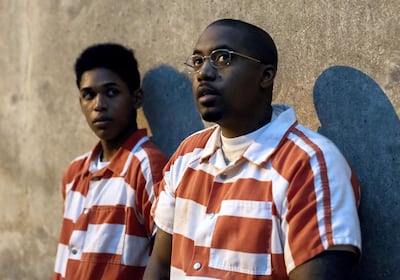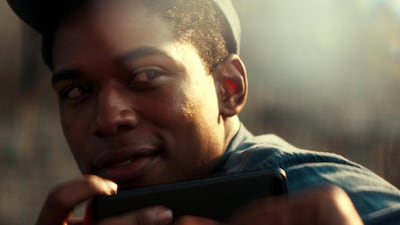There's a really good movie in Monster.
Former music video and commercial director Anthony Mandler's debut feature film tells the story of seventeen-year-old student Steve Harmon, who is already showing tremendous promise as a filmmaker. When Monster opens, though, he has just been arrested for his alleged involvement in the murder of a shopkeeper.
Unsurprisingly, Steve struggles in prison, and as he prepares for his trial alongside his lawyer Katherine O’Brien, we see his vivacious personality crumble and be replaced by anxiety. All the while, the film dives into Steve’s backstory, focusing on his relationship with his parents, his various friends and enemies in Harlem, and his camaraderie with his film teacher Leroy Sawicki.
Monster's story structure and characteristion is actually handled rather nicely. You get a genuine sense of each character and you're never lost, either emotionally or with the plot itself. Unfortunately, though, the manner in which it connects its nonlinear narrative proves to be the film's downfall.
Mandler and his team of writers – Radha Blank, Cole Wiley, and Janice Shaffer – use an infuriating style of voiceover, which sees Steve telling his story to the audience as if he was a screenwriter. While this was a key part of Walter Dean Myers' 1999 book Monster is based on, as a filmmaking technique it feels at odds with the highly dramatic plot of a teenager falling apart in prison. So much so that it completely takes the viewer out of the movie.

It's to Monster's credit then that come the end of its rather lean 98 minute running time you've managed to reinvest in Steve's plight. That's almost entirely down to Kelvin Harrison Jr's rather stunning portrayal. There's a sincerity, poignancy, and depth to Harrison throughout, and you get a sense of the growing terror that is flowing through his veins as he faces up to 20 years in prison.
Harrison isn't alone in propping up Monster with his performance. Jeffrey Wright and Jennifer Hudson are effective as Steve's distressed and guilt-ridden parents, Tim Blake Nelson is solid as his likable teacher, while John David Washington's brief turn as a ne'er-do-well is particularly eye-catching, too.
It's just a shame that, because of its narration, Monster isn't really able to dive into the detail of the justice system, racial prejudice, and what being incarcerated does to an individual. There are moments where it flirts with these topics, and even manages to provide some honesty and hope amidst the tension and the pain. But anytime it feels close to having something profound and lasting to say, Steve's thoughts arrive to needlessly take it in a more generic direction.
Monster does manage to find a nice rhythm in its final act. Its last courtroom scene is handled in a creative and captivating fashion, while there's a nuance to each of its characters that makes them feel real and relatable. But all this does is make it all the more frustrating that one stylistic choice holds Monster back from reaching its full potential.
Monster is out on Netflix on Friday, May 7

